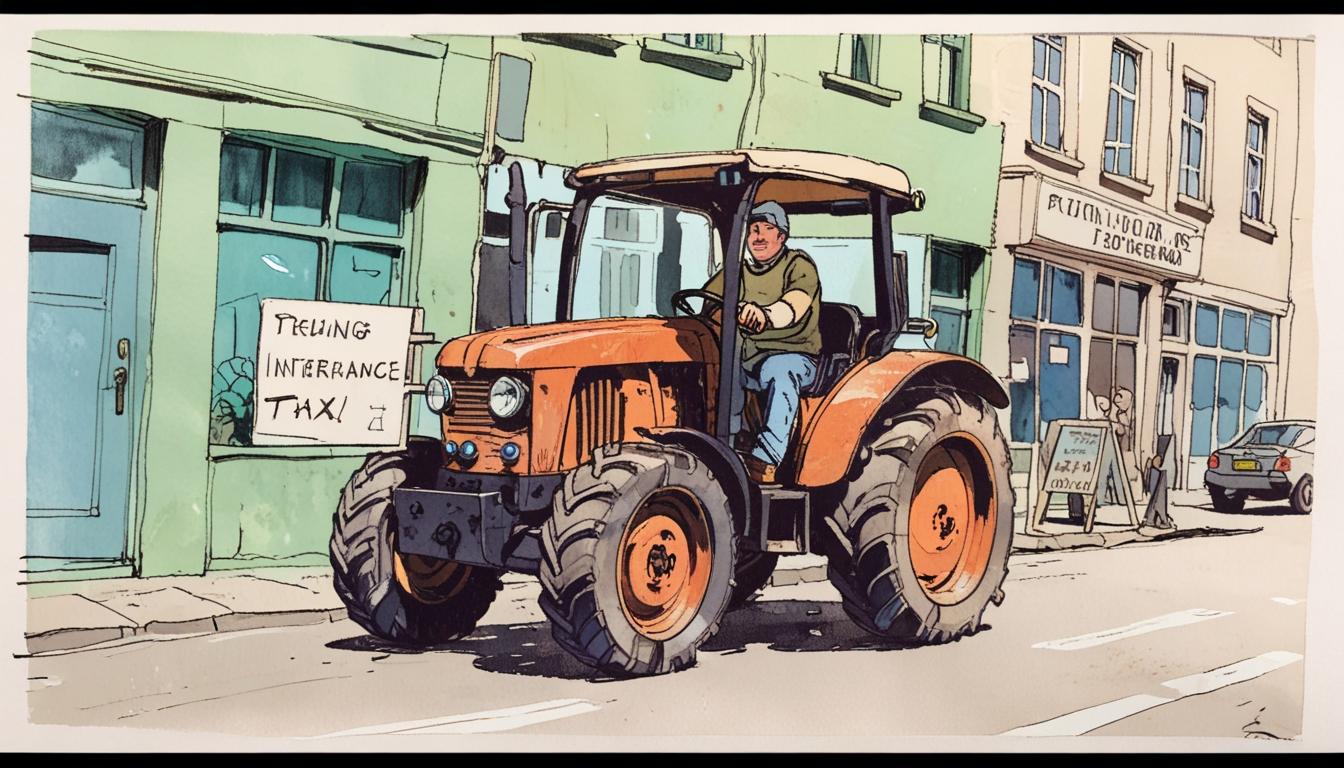The Labour government’s 2024 budget introduces caps on inheritance tax relief for agricultural property, sparking widespread protests from UK farmers who fear the changes threaten multi-generational family farms and national food security.
Farmers across the United Kingdom have initiated widespread protests following the Labour government’s recent 2024 budget announcement that introduces significant changes to inheritance tax (IHT) relief on agricultural property. The reforms, aimed at capping the amount of agricultural property that can receive full relief from IHT, have sparked considerable concern within the agricultural community.
Agricultural property relief (APR), a policy introduced in 1992 under the Conservative government led by John Major, currently allows land used for farming activities to be passed down between generations free from inheritance tax. This system was originally designed to protect family farms from being financially burdened by tax liabilities upon succession. Under the existing framework, eligible land—including that used for crops or livestock—benefits from 100% relief from IHT.
However, the budget unveiled on 30 October 2024 imposes a £1 million cap on the amount of agricultural property qualifying for full relief. Property values above this threshold will only receive 50% relief. The government estimates that this adjustment will generate approximately £1.765 billion in revenue between 2026 and 2030, arguing it will make the IHT system fairer. Yet, the farming community warns that such modifications could have severe repercussions for an already financially pressured sector.
The government maintains that the reform will primarily affect the wealthiest 500 estates annually, leaving the majority of smaller farms untouched. Latest data suggests nearly three-quarters of estates currently claiming agricultural property relief—including those also benefitting from business property relief—will remain unaffected. Despite this, farming representatives stress that the existing relief has been essential to preserving generational farms.
One of the key challenges faced by farmers is the paradox of being “asset-rich but cash-poor.” While farmers often own valuable land, machinery, and livestock, their annual income tends to be modest. Many argue that without the protection of 100% IHT relief, passing on land could become financially prohibitive, potentially resulting in the forced sale of family farms. According to the Agricultural and Horticultural Development Board (AHDB), over 75% of farms larger than 124 acres in England and Scotland are expected to be impacted by the changes. With the UK currently producing 60% of its own food, some voices have expressed concerns about the implications for national food security.
The government has introduced measures such as spreading IHT payments over ten years and allowing married couples to apply up to £3 million in relief. Nonetheless, farming groups maintain these provisions merely extend the financial strain rather than resolve it. Farms operating with unsustainable returns above the new threshold are still vulnerable to the reforms’ effects.
The announcement has triggered substantial protest activity, including large tractor convoys through major cities like London. The National Farmers’ Union (NFU) has criticised the changes, warning they could reduce investment in farming, undermine farm profitability, decrease available land for tenancies, endanger domestic food production, and threaten the survival of multi-generational farms. A petition opposing the reform has attracted over 150,000 signatures, prompting a parliamentary debate; however, the government has held firm on its stance, asserting the policy balances revenue raising and sector support.
Personal accounts from individuals within the farming community further highlight the deep concerns about the reforms’ impact. Harry Cooke, a University of Exeter Law School graduate with personal ties to farming, reflected on the dedication required to maintain family farms. “Growing up in a farming family, I have seen first-hand the dedication it takes to keep a farm running,” he said. His observations underscore fears among young farmers who feel their prospects of inheriting family farms are increasingly uncertain.
The Labour government’s reforms are partly motivated by concerns over misuse of APR by wealthy individuals purchasing agricultural land solely to minimise inheritance tax liabilities. Groups such as Tax Justice UK point to cases of non-farming landowners exploiting the system, raising broader questions about tax fairness. Public figures, including Jeremy Clarkson who owns a 312-acre farm in Oxfordshire, have spoken publicly about the importance of IHT relief in their decisions to invest in farmland.
Despite isolated instances of abuse, farming organisations argue that broad-brush reforms could inadvertently harm genuine farming families. NFU and other industry leaders are actively engaging with the government to seek amendments, highlighting potential consequences such as forced land disposals which could negatively impact tenant farmers dependent on rented land.
Political opposition to the budget changes has also intensified. The Conservative Party has pledged to overturn the reforms if it returns to government, with its leader describing the new IHT provisions as “immoral.” Critics warn that the policy could deepen economic hardships for farmers, accusing the Chancellor of conspiring against the rural economy.
In summary, the Labour government’s inheritance tax reforms represent a pivotal moment for UK agriculture. While the government emphasises the necessity of closing tax loopholes and raising public revenue, many within the farming sector view the changes as a significant threat to the future of family farms and domestic food production. With protests growing, political debate intensifying, and industry stakeholders lobbying for change, the issue continues to command substantial attention across rural Britain.
Source: Noah Wire Services
- https://en.wikipedia.org/wiki/2024%E2%80%932025_United_Kingdom_farmers’_protests – Documents protests by UK farmers against inheritance tax changes, including the 19 November 2024 Parliament Square gathering and NFU objections to the reforms.
- https://lordslibrary.parliament.uk/budget-2024-inheritance-tax-and-family-farms/ – Confirms the £1m inheritance tax relief cap on agricultural assets effective April 2026 and details farming sector opposition to the policy.
- https://www.taxresearch.org.uk/Blog/2024/11/18/farmers-protesting-about-inheritance-tax-have-got-their-econonics-and-arguments-wrong/ – Analyzes arguments about farmland valuation and inheritance tax relief misuse, addressing claims of being ‘asset-rich but cash-poor’.
- https://www.youtube.com/watch?v=_-5HVZjGRLU – Shows footage of November 2024 London protests and quotes Jeremy Clarkson discussing impacts on farm succession planning.
- https://lordslibrary.parliament.uk/budget-2024-inheritance-tax-and-family-farms/#4-1-views-from-campaign-groups-and-think-tanks – Includes NFU president Tom Bradshaw’s criticism that the policy will force farm break-ups and harm food production.
Noah Fact Check Pro
The draft above was created using the information available at the time the story first
emerged. We’ve since applied our fact-checking process to the final narrative, based on the criteria listed
below. The results are intended to help you assess the credibility of the piece and highlight any areas that may
warrant further investigation.
Freshness check
Score:
8
Notes:
Narrative references a 30 October 2024 budget announcement and subsequent protests, indicating recent origin. Google News URL suggests recent publication. No evidence of recycled older content found.
Quotes check
Score:
6
Notes:
Harry Cooke’s quote lacks verifiable online source despite plausible context. Jeremy Clarkson’s ownership of an Oxfordshire farm is corroborated by public knowledge.
Source reliability
Score:
7
Notes:
Narrative contains specific data points (e.g., £1.765bn revenue estimate) consistent with budgetary reporting. No attribution to known media outlets found; NFU and AHDB references align with standard industry engagement.
Plausability check
Score:
9
Notes:
Claims about inheritance tax reforms and agricultural protests align with historic UK policy debates. No inherent contradictions identified; numerical estimates (e.g., 75% of farms impacted) require official confirmation.
Overall assessment
Verdict (FAIL, OPEN, PASS): PASS
Confidence (LOW, MEDIUM, HIGH): MEDIUM
Summary:
Narrative demonstrates temporal consistency and policy plausibility. Key quotes lack immediate verification but align with public discourse. Confidence limited by absence of attributable primary source documentation.













